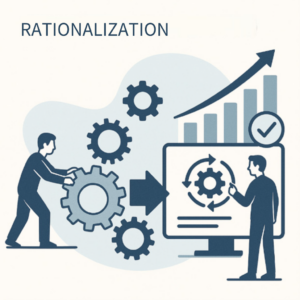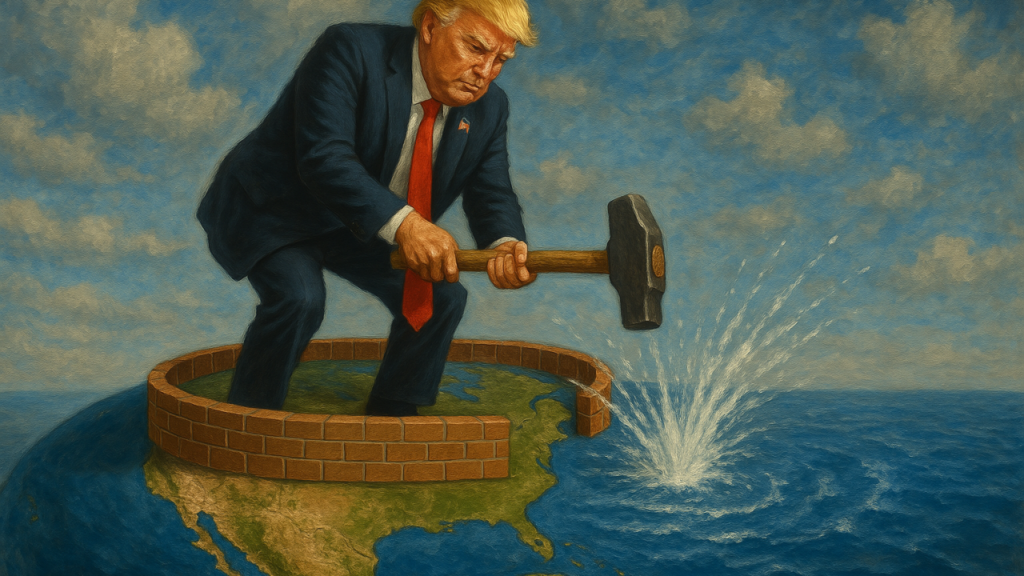Let’s use the pressure from outside to finally increase our productivity!
There we have it, the tariff hammer…
The American president has done what he has been proclaiming for 30 years. Specialists may decide whether his measures are expedient for the USA. We can tremble at the risks of the American decision, but we can also see our opportunity. The chance that the pressure from outside will be so great that we will finally overcome our own negligence.
For years, I have been concerned about the lack of productivity development in Germany in particular, but also in Europe as a whole, and I have already commented on this on several occasions. We could be doing much more to increase productivity in our companies, but we are not, and I cannot help but feel that the retreat into the private sphere triggered by the COVID-19 pandemic has increased our comfort levels even further.
On the other hand, the pandemic has shown us that, given the right pressure, we are also able to utilise our technological possibilities. Where would we be today with electronic communication without the pandemic? A lot, perhaps even most of it, would have been possible before, but only a few companies were prepared to make consistent progress in this direction; it was only the external pressure from the pandemic that got things moving.
I also see corresponding opportunities for us today. The productivity reserves in our companies should still be considerable. I still remember the situation in the automotive supply industry in the 1990s, when Dr Ignacio Lopez was head of purchasing at VW. VW was in a bad economic situation at the time, and Lopez tried with all his might to push purchasing prices down. In doing so, he expected price reductions from suppliers that were far higher than anything that would have been expected. The margins at many of the suppliers were barely higher than 3 % at the time, so there was a massive outcry in the supply industry. In the end, many companies had no choice but to accept drastic price reductions, and lo and behold, three years later the profit margin was back at 3 %.
From the mid-1990s to the mid-2000s, I worked intensively in the reorganisation business, where I also found time and again that there is great potential for increasing productivity if you are prepared to tackle it consistently. In the 1990s, the term ‘rationalisation’ had increasingly negative connotations. I believe we must learn to return to the core idea of rationalisation, to achieve greater efficiency and productivity with less effort by simplifying and automating processes.

However, the focus of rationalisation today must be in the indirect areas, in the office workplaces. The direct areas have already been considerably rationalised in most companies, which is not to say that there is not still room for improvement there. However, the decisive leverage certainly lies in the indirect areas. The fact that bureaucracy in companies has increased dramatically in recent years is not only due to government regulations, but at least as much to the fact that processes have been broken down too much and too many new jobs have been created, and as we all know, every job creates its own work.
‘We must learn again that it is not the state that ensures economic success, but economic success that ensures the state.’
Our task now will be to consistently and quickly thin out and automate processes. We have to do more with fewer staff in the short term, and I am convinced that we can do this, but we have to get used to it again. We have to learn again that it is not the state that ensures economic success, but economic success that ensures the state. In recent years, we have seen far too much state intervention, which has slowed down the competitiveness of our industry. Too many subsidies for companies that are no longer economically successful in order to secure jobs that would have created more value elsewhere, and the generous use of short-time working also ultimately represents a subsidy for a lack of productivity.
So let’s use the Trump factor to massively boost our productivity. In the medium term, this will compensate for the tariff surcharges on our exports to the USA and in the long term we will increase our competitiveness, because at some point there will be a time when tariffs are lower again and it will be recognised that global prosperity increases more if we rely on comparative competitive advantages instead of mercantilism.


